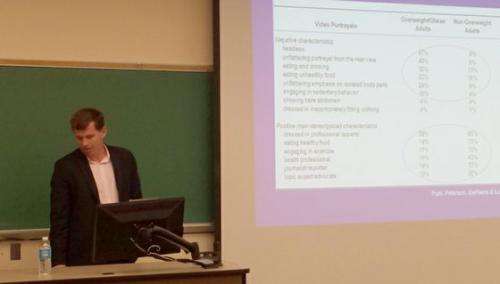Obesity stigma real and prevalent

(Medical Xpress)—Well-known obesity expert Joe Nadglowski, president and CEO of the Obesity Action Coalition, recently visited the University of New Mexico and presented two informative lectures related to obesity. Sponsored by the UNM Department of Psychology in response to an obesity issue that arose in the department, Nadglowksi talked about how obesity affects every facet of life for obese individuals.
"Weight bias penetrates every facet of life for individuals affected by the disease of obesity. Education, employment, healthcare and more are all areas where folks find themselves targeted by bias," Nadglowski said. "Obesity is a complex disease, and weight bias often hinders an individual's ability to take the necessary steps to improve their quality of health."
Nadglowski described the cycle of obesity that involves health consequences, increased medical visits, bias in healthcare, negative feelings, avoidance of healthcare, unhealthy behaviors and poor self-care and also talked about its prevalence in education, healthcare and the workplace.
Defined as medical condition, obesity is considered one of the most serious public health problems of the 21st century. It's a condition where body fat has accumulated to the point where it could have a negative effect on one's health. And it has. It's estimated that 10 percent of U.S. medical costs are tied to obesity. It's also one of the most preventable causes of death worldwide. The portrayal includes 72 percent of images and 65 percent of videos that stigmatize obese people.
Medically speaking, obesity increases the possibility of any number of diseases including heart disease, high blood pressure, type 2 Diabetes, obstructive sleep apnea and a number of cancers as well. In terms of patient care, obese patients are less likely to seek medical attention including pelvic exams, mammography, cancer screens and are more likely to cancel exams, delay appointments and or preventive care services.
"Patients feel berated and disrespected by providers and get upset by comments about their weight from their doctors," Nadglowski said during the lecture. "They perceive that they will not be taken seriously and report that their weight is blamed for all their problems. Additionally, they are reluctant to address weight problems."
In the workplace, the numbers are troubling with obese workers experiencing prejudice 43 percent of the time from employers and 54 percent of the time from co-workers. Obese people often cite inequitable hiring practices, lower wages, prejudice, wrongful job termination and disciplinary action. In terms of pay, data shows that women's wages are 61 percent lower, while men's wages are 34 percent lower.
The bias is also prevalent in education where obese students experience extensive peer victimization at school, bias by teachers and administrators and institutional-level weight bias.
"In a recent study of graduate school applications, the data showed that despite having higher quality letters of recommendation, those with a higher BMI were less likely to receive admission offers after once they had completed in-person interviews," Nadglowski said.
Nadglowski also offered some advice about interactions with obese people including: keeping weight bias on the agenda, increased attention to weight bias and its consequences, using respectful language, avoiding approaches that shame and blame, focus on specific health behaviors, remove the stigma from existing efforts and finally, fight obesity, not people with obesity.


















